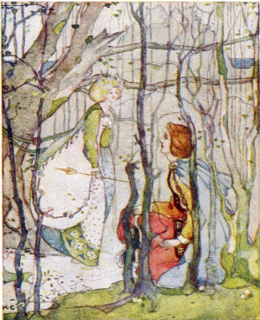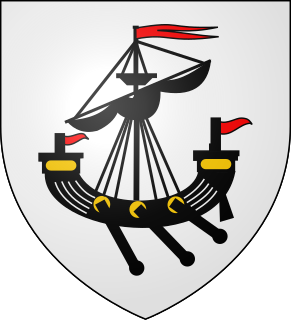Related Research Articles

Sir Thomas de Ercildoun, better remembered as Thomas the Rhymer, also known as Thomas Learmont or True Thomas, was a Scottish laird and reputed prophet from Earlston in the Borders. Thomas' gift of prophecy is linked to his poetic ability.

The House of Stuart, originally Stewart, was a royal house of Scotland, England, Ireland and later Great Britain. The family name comes from the office of High Steward of Scotland, which had been held by the family progenitor Walter fitz Alan. The name Stewart and variations had become established as a family name by the time of his grandson Walter Stewart. The first monarch of the Stewart line was Robert II, whose male-line descendants were kings and queens in Scotland from 1371, and of England and Great Britain from 1603, until 1714. Mary, Queen of Scots, was brought up in France where she adopted the French spelling of the name Stuart.

These Old Shades (1926) is a Georgian romance novel written by British novelist Georgette Heyer (1902–1974). It was an instant success, and established her as a writer. It falls into the category of historical romance.
Sir Aldingar is Child ballad 59. Francis James Child collected three variants, two fragmentary, in The English and Scottish Popular Ballads. All three recount the tale where a rebuffed Sir Aldingar slanders his mistress, Queen Eleanor, and a miraculous champion saves her.
"The Summoner's Tale" is one of The Canterbury Tales by Geoffrey Chaucer.

"Matty Groves", also known as "Little Musgrave and Lady Barnard" or "Little Musgrave", is a ballad probably originating in Northern England that describes an adulterous tryst between a young man and a noblewoman that is ended when the woman's husband discovers and kills them. It is listed as Child ballad number 81 and number 52 in the Roud Folk Song Index This song exists in many textual variants and has several variant names. The song dates to at least 1613, and under the title Little Musgrave and Lady Barnard is one of the Child ballads collected by 19th-century American scholar Francis James Child.

"The Goose Girl" is a German fairy tale collected by the Brothers Grimm and first published in Grimm's Fairy Tales in 1815. It is of Aarne-Thompson type 533.
"Lady Isabel and the Elf Knight" is the English common name representative of a very large class of European ballads.

"Hind Horn" is a traditional English and Scottish folk ballad.
"Prince Robert", also known as "Lord Abore and Mary Flynn", is Child ballad number 87, existing in several variants, and a murder ballad.
The Bent Sae Brown is Child ballad 71.
Fause Foodrage is a Scottish murder ballad of the 17th or 18th century. It was first printed by Walter Scott in Minstrelsy of the Scottish Border (1802). Scott cited Elizabeth, Lady Wardlaw as the ballad's probable author.
"Gil Brenton" is Child ballad 5, Roud 22, existing in several variants.
In terms of fiction, a quibble is a plot device, used to fulfill the exact verbal conditions of an agreement in order to avoid the intended meaning. Typically quibbles are used in legal bargains and, in fantasy, magically enforced ones.
"Christopher White" is #108 of the Child Ballads, the collection of 305 ballads from England and Scotland, and their American variants, collected by Francis James Child in the late nineteenth century. The collection was published as The English and Scottish Popular Ballads between 1882 and 1898 by Houghton Mifflin in ten volumes.

For the Child ballad, see The Lord of Lorn and the False Steward.
Sir Cawline is Child ballad 61. A fragmentary form exists in The Percy Folio.
King Horn is a Middle English chivalric romance dating back to the middle of the thirteenth century. It survives in three manuscripts: London, British Library, MS. Harley 2253; Oxford, Bodleian Library, MS. Laud. Misc 108; and Cambridge, Cambridge University Library, MS. Gg. iv. 27. 2. It is thought to be based on the Anglo-Norman Romance of Horn (1170). The story was retold in later romances and ballads, and is considered part of the Matter of England. The poem is currently believed to be the oldest extant romance in Middle English.

Sir Gowther is a relatively short Middle English tail-rhyme romance in twelve-line stanzas, found in two manuscripts, each dating to the mid- or late-fifteenth century. The poem tells a story that has been variously defined as a secular hagiography, a Breton lai and a romance, and perhaps "complies to a variety of possibilities." An adaptation of the story of Robert the Devil, the story follows the fortunes of Sir Gowther from birth to death, from his childhood as the son of a fiend, his wicked early life, through contrition and a penance imposed by the Pope involving him in a lowly and humiliating position in society, and to his eventual rise, via divine miracles, as a martial hero and ultimately to virtual canonization. But despite this saintly end, "like many other lays and romances, Sir Gowther derives much of its inspiration from a rich and vastly underappreciated folk tradition."
Roswall and Lillian is a medieval Scottish chivalric romance. A late appearing tale, it nevertheless draws heavily on folkloric motifs for its account of an exiled prince, reduced to poverty, who rises from it to win a princess.
References
- ↑ Francis James Child, English and Scottish Popular Ballads "The Lord of Lorn and the False Steward"
- ↑ Laura A. Hibbard, Medieval Romance in England p290-1 New York Burt Franklin,1963
- ↑ Helen Child Sargent, ed; George Lymn Kittredge, ed English and Scottish Popular Ballads: Cambridge Edition p 586 Houghton Mifflin Company Boston 1904